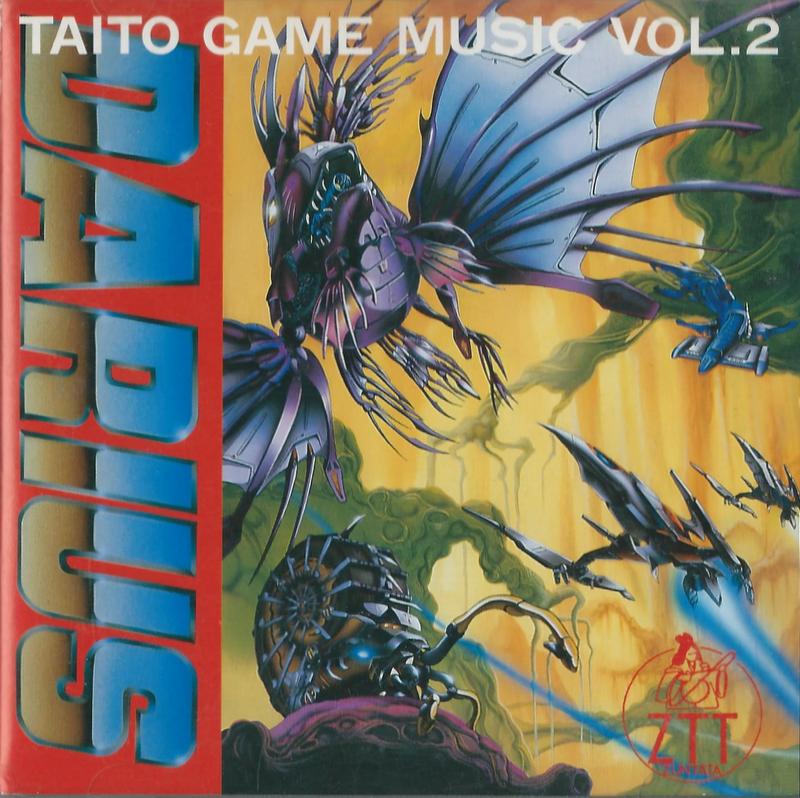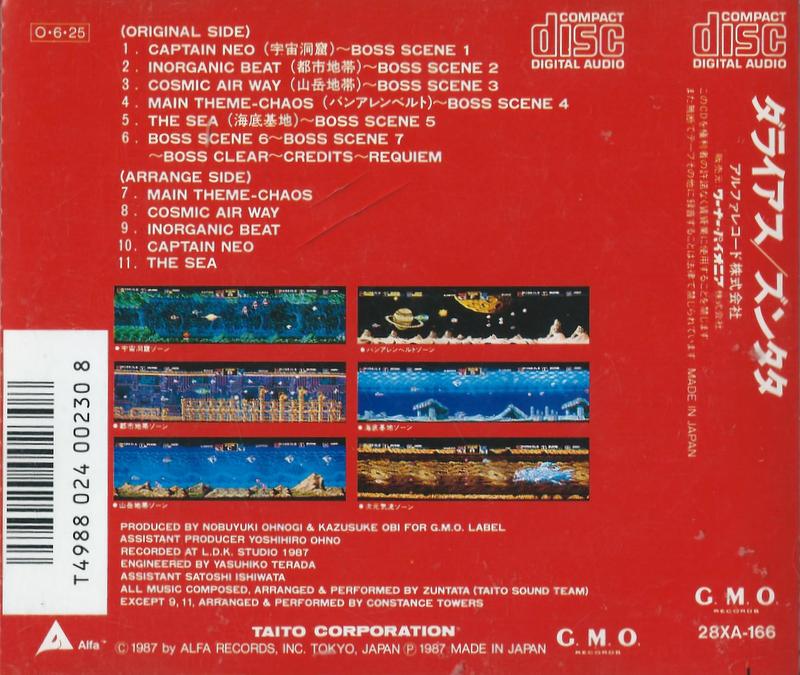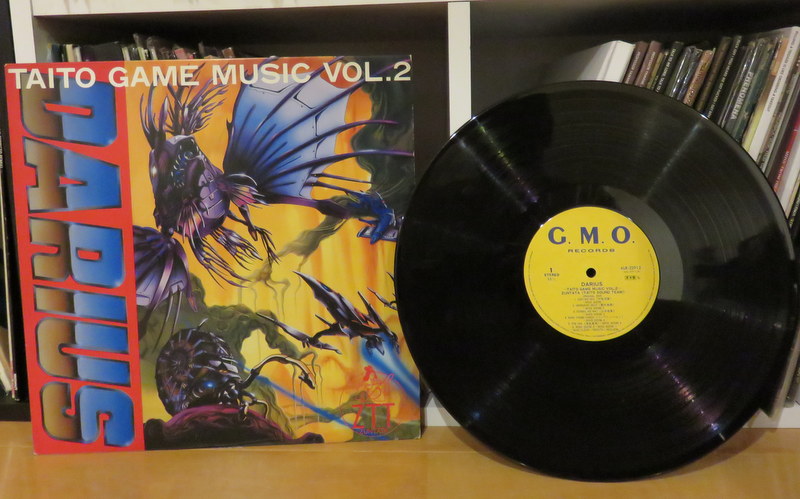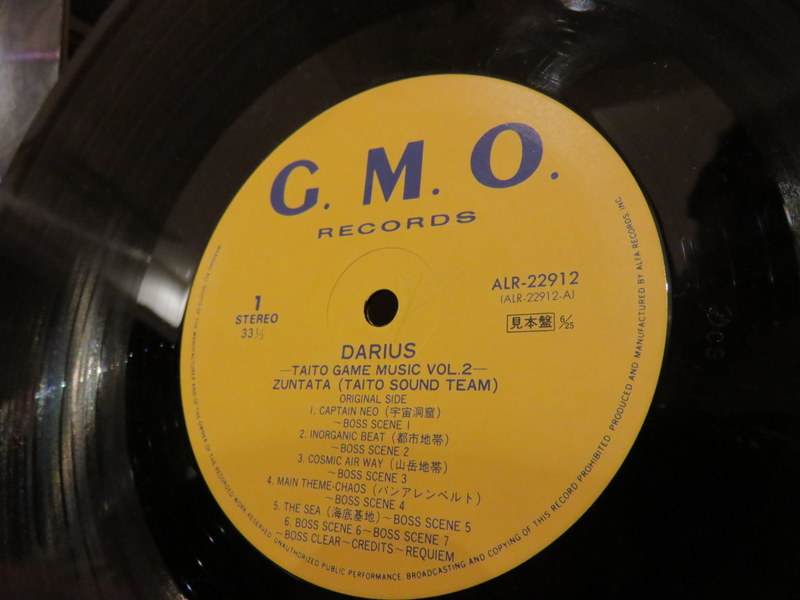Game Music Revue: Darius – Taito Game Music Vol. 2

Darius – Taito Game Music Vol. 2
- Credited Composer: Zuntata
- Released June 25, 1987
- Label: G.M.O./Alfa Records
- VGMdb Information Page
If Gradius is the grandfather of side-scrolling shoot-em-ups, then Darius is it’s weird uncle.
(In case you’re wondering, in this analogy R-Type is the cousin with the cool toys who won’t let you play with them.)
Everything about Darius is weird. The enemies, evil fish robots from space, are weird. The game’s original arcade presentation, a sit down cabinet with three (three!) monitors is weird. And the soundtrack, holy hell, the soundtrack might be one of the weirdest, most avant-garde pieces of music ever composed for an arcade game.
The soundtrack to Darius is credited to Taito’s “house band” Zuntata, which, in case you were wondering, is Japanese onomatopoeia for the rhythm of a waltz (zun ta ta zun ta ta zun ta ta). Zuntata (headed by Hisayoshi Ogura up until rather recently) would serve as the composers for most of Taito’s most beloved games, including Ninja Warriors and Bubble Bobble. And while most games featuring the music of Zuntata/Ogura have fantastic scores, the soundtrack to the original Darius really stands on its own as something special.
At the time, most game music was still rather simple. And when it was complex, as in the case of Gradius or other arcade games of the era, it was trying to mimic rock music or orchestral compositions. The Darius theme is having none of that, and instead takes a hard left into modern classical, experimental electronic music and acid jazz.
Because that’s what you listen to when you’re battling giant space fish.

The second stage theme, entitled “Inorganic Beat” is an even stranger sonic jolt. Driven by the titular “inorganic” beat (a breakbeat that early electro fans should eat right up), the only additional music comes in an occasional crunchy synth-guitar riff and some sparse, high-pitched faux-piano. But when the boss fight kicks in the entire thing changes. The breakbeat morphs into a rolling sequencer rhythm, and a squealing synth that pretty much just repeats the same two notes over and over again.
But no track on the original Darius soundtrack better encapsulates the game’s craziness and originality more than the main theme, entitled “Chaos.” Apt name for a track that swings wildly back and forth between manic explosions of sound (set to a time signature that would make Rush flinch) and quiet pulsing beats, reminiscent of Space Invaders, coupled with eerie, alien sirens. It’s right up there with the stage one theme of Streets Of Rage and Outrun‘s “Magical Sun Shower” as one of the greatest and most memorable game music compositions of all time.
But as weird and great as the game’s music is, the second half of the album is somehow even weirder. This is where the “arranged” version gets to shine. As I’ve mentioned in previous reviews, “arrange” is Japanese for remix, but it some cases the remixes are actually full-blown remakes of the original versions – as is the case here. Some of the arranged versions on this album are relatively simple covers that take the game’s basic music and rework it on traditional instruments and synthesizers. That’s what they do with “Chaos” and it works beautifully.
Others are a bit more liberal. “Inorganic Beat” is completely reworked from the ground up, with many of the song’s original elements (including the beat) redone completely. The result is a track that sounds almost nothing like the song from the game, but batshit insane in its own right, like some sort of nightmare combination of bassa nova, industrial music, modern classical and jazz. But weirder. Halfway through the entire things breaks into seemingly random noise for a good ten seconds before building back up again. It’s jarring and honestly kind of a mess, all the more reason why I love it.

The album ends with an arranged version of stage four’s game theme, “The Sea,” although to be quite honest I have a hard time believing that the arrange track has anything in common with the original version aside from the name. The original is one of the strangest tracks from the game (which is really saying something) starting as a quiet, almost minimal piece before building with layers of jarring synthesizers and strange, off-tempo loops. The arranged version is strange, but in an entirely different way. The first half sounds like a lounge pianist fiddling with his keys while a bass player jams in the background. The second half…I don’t even know. Like if Material and Was (Not Was) jammed out a Phillip Glass number? Then at the last minute an element of the original game music plays. It’s so off-putting and bizarre I don’t even know if it I would say I like it. But it sure is interesting, and not the kind of thing I think anyone would expect to hear on the soundtrack to a game about killer alien fish robots.

Darius – Taito Game Music Vol. 2 was originally released on CD, vinyl and cassette in 1987. This album is entirely out-of-print and I don’t see them pop up online that much. I’ve seen them go for anywhere between $20 and $70 when they do though, so if you see one for a steal snag it.
A version of the album is on iTunes, complete with the same artwork. Although beware, this is not the same album! This version only features the original game audio. The stage and boss tracks are now split, so it looks like you’re getting more music for your buck, but you’re really only getting half the record. If you just want the game audio it’s a good deal though. According to the VGMdb, another version of the original game’s music was released in 1992 by Scitron. I don’t know if this has all the arranged versions that were present on the original, however. There is a strange Darius compilation out there called Darius Omnibus also, and the arranged versions on it are not the same as the ones on this album, nor does it feature the original game audio.
The complete Darius soundtrack might be a little hard to find these days, but it’s more than worth it if you want to see just how out there old-school game audio can get.
Leave a Reply